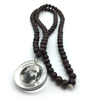Wild Mind: Living the Writer’s Life

Wild Mind: Living the Writer’s Life
by Natalie Goldberg
Bantam Books, 1990
238 pages
Paperback and Kindle:
amazon.com
This delightful, pithy book by a Zen meditator, writer, and teacher is useful, sage, and nourishing – for anyone who loves to scribble – or possibly even if you don’t.
The chapters are very short, and are followed by suggestions for exercises you can do alone or in a class. They are geared towards opening your unconscious like a faucet to flow upon the page; and yet you will be approaching that freedom from different novel angles – ways of perceiving, ways of describing that you might not have thought of yourself.
Her first book, Writing Down the Bones, was a huge success; this is a worthy follow-up. I was reading it a bit at a time, on the bus to work (back in the days not so long ago when taking the bus was still safe!) over a period of months. I’d find a chapter or two a perfect dose of Zen wake-up and a nice dose too of pleasure and surprise. Ms Goldberg is fearless, original, isn’t shy of leaping from subject to subject in a single paragraph – and yet somehow the book is calm and perfectly organized.
The inherent liberality in it – she discusses her switch to dating women, among other things – is a hugely welcome breeze of sanity and spaciousness. At the same time I was reading this on the bus, I was reading at night a book called Three Classics by American Women – by Willa Cather, Edith Wharton, and Kate Chopin. These superbly written novellas each described an extramarital affair that ended very, very badly, and were full of the suffering and angst of times gone by. Those medieval strictures are simply absent in Wild Mind, and a damn good thing that is too.
In one of the Try this sections at the end of each chapter, Goldberg quotes a fellow writing teacher, Kate Green, saying, “If you want to write, you have to be willing to be disturbed.” Natalie adds, “Pretty good. It’s true.
“Write what disturbs you, what you fear, what you have not been willing to speak about. Go for ten, fifteen, twenty minutes. Be willing to be split open.”
Another:
“Either by yourself or with a partner list five abstract statements. Try some simple ones, too, like “Thank you.” “I’m sorry.” Now back each one up with at least a paragraph of solid, concrete details…
“Now switch. Describe a situation in detail and then take a leap into a cosmic statement.
“There are lots of possibilities. Have fun.”
And another:
“Write about something you really loved, a time when you felt whole and complete in an activity all for itself. It could be something as simple as learning to make a grilled cheese sandwich, or a time your uncle taught you to tie your shoelaces into a bow. Something you concentrated on as a kid because the ability to concentrate is where the bliss and love came from. Be specific but don’t forget to throw in a detail about a cloud out the window as you bent to tie the shoe or the chandelier above your head as you leaned down. This is good practice. While you concentrate and narrow in, you are also aware of the whole world.”
Natalie Goldberg sees writing as a Zen practice, and teaches us how to see it that way too. I didn’t need convincing – I just enjoyed the genius of simple, deft truths; the entertainment of the life-experiences of her own that she describes; and the fun of collecting new exercises in case I ever teach a writing class again. I rarely hang onto a book once I’ve finished it, but this one is a keeper.
Madhuri is a healer, artist, poet and author of several books, Mistakes on the Path being her latest memoir. madhurijewel.com
- Log in to post comments
- 21 views
